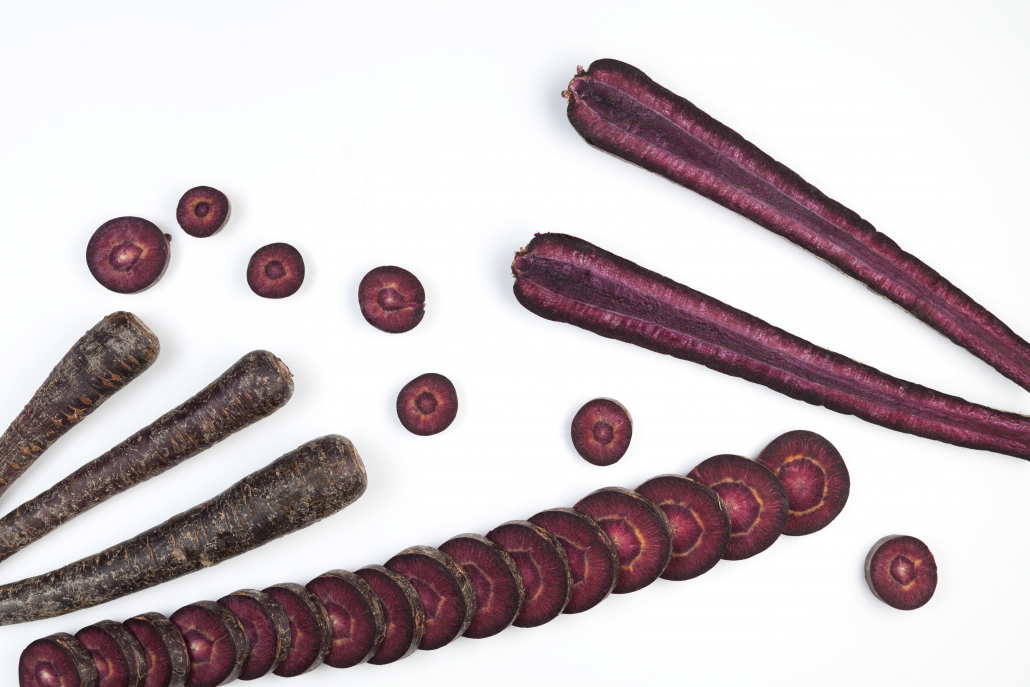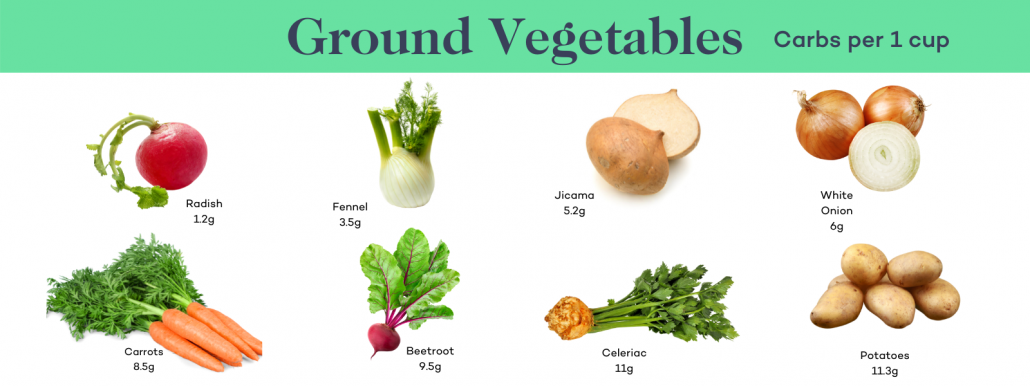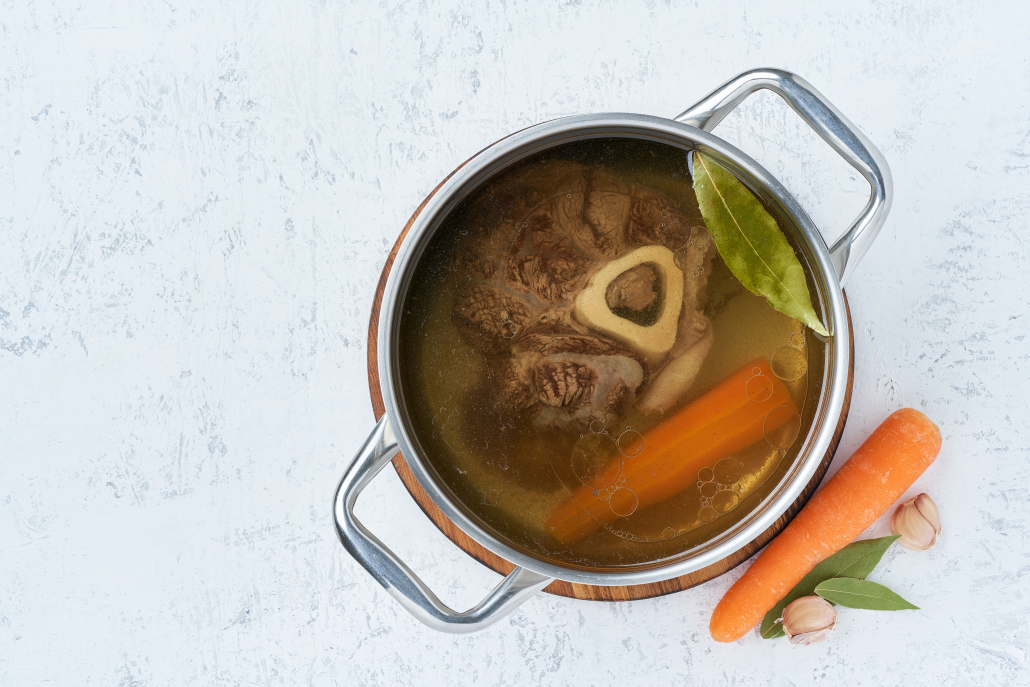We include products in articles we think are useful for our readers. If you buy products or services through links on our website, we may earn a small commission.
Low Carb Keto Root Vegetables: Benefits and Drawbacks

Table of Contents
Low-carb and keto diets are extremely popular these days. Though most low-carb ways of eating are rightfully centered on fatty whole animal foods, there may be a place in your diet for a selection of low-carb keto root vegetables.
In this article, we’ll highlight 8 of the top keto-friendly, low-carb root veggies to choose from, and explore their benefits and potential downsides.
Low Carb Root Vegetables on Keto?
A ketogenic diet is defined by two things, high-fat and ultra-low carbohydrate intake.
Accessing the ketogenic state of ketosis requires cutting carb intake down to 20 grams per day, in the beginning. And up to 60 grams once your body is keto adapted. [2]
Because carb intake on the keto diet is so low, other macronutrients have to take its place — and those macronutrients are predominantly fat.
Limiting carbs so drastically typically requires an adaptation period, but once a person is keto-adapted, all sorts of mental and physical benefits begin to arise: [1]
- Reduced fat mass
- Reduced inflammation
- Increased muscle mass
- Reduced oxidative stress
- Increased energy and clarity
- Freedom from food addiction
- Increased lifespan and healthspan
The average person’s transition to keto looks like this:
- A brief adaptation phase characterized by some uncomfortable symptoms known as ‘keto flu’
- A stabilization of energy, increased mental clarity, and loss of weight.
- A desire to moderately diversify your diet once your body is keto-adapted.
Step 3 is exactly where keto-friendly root vegetables come in. Let’s look at some reasons why some below-ground root veggies are well-suited to the keto diet.
Why Below Ground Veggies?
Vegetables can offer potent antioxidants and provide alkalinity to your diet’s pH balance. Veggies are also a staple food group on the vegan, vegetarian, and Mediterranean keto diets.
Yet veggies also contain numerous naturally occurring plant toxins and antinutrients.
Thankfully, below-ground keto root vegetables tend to be much lower in these potentially harmful chemicals compared to their above-ground counterparts.
Below ground keto root veggies are typically:
- Lower in saponins
- Lower in phytic acid
- Lower in phytohormones
- Lower in other antinutrients
- Lower in insoluble (undigestable) fiber
Featuring occasional below-ground root vegetables in your diet has other benefits, too. Research shows that a diet based around meat, roots, and fruits is consistent with how our ancestors ate. In other words, we humans evolved to eat lots of fatty meat, go long periods of time without eating, and have the occasional carby snack.
Context established, let’s take a look at 8 root vegetables that are high in nutrients and relatively low in carbs.
Top 8 best Keto Root Vegetables

- Rutabaga
- Celeriac
- Beetroot
- Onion
- Carrot
- Parsnip
- Turnip
- Radish
1. Rutabaga
Less commonly referred to as a swede, or Swedish turnip, the rutabaga is a hybrid of cabbage and turnip. It is high in several key electrolytes and low in carbs.
As a cruciferous vegetable, rutabaga contains compounds called glucosinolates. These chemicals have been shown to break down in your body into other compounds that can fight cancer. 3 However, it’s a bit like chemo where the very chemicals that can fight cancer can also damage other cells.
Along with glucosinolate, rutabaga contains numerous other plant chemicals that can inflame bowl disorders, and should be avoided by people with these issues. 4
Macronutrients
| 100 grams Rutabaga | |
| CALORIES | 50.4 |
| NET CARBOHYDRATES | 9.8 grams |
| PROTEIN | 1.4 grams |
Micronutrients | |
| Vitamin C | 39% |
| MAGNESIUM | 7% |
| VITAMIN B6 | 11% |
2. Celeriac
Also known as celery root, celeriac is a low carb root vegetable with a smooth texture that makes it easy to properly prepare. Celeriac is most popular in French cuisines.
Macronutrients
| 100 grams Celeriac | |
| CALORIES | 44 |
| NET CARBOHYDRATES | 9.2 grams |
| PROTEIN | 1.5 grams |
Significant Micronutrients | |
| VITAMIN C | 13% |
| MAGNESIUM | 14% |
| VITAMIN B6 | 8% |
3. Beetroot
Beetroot is low carb root vegetable known and loved for its bright color and culinary versatility. Beetroot also stands out for its nitrate content — its dietary nitrates make it an ideal food for athletes who want to enhance their body’s ability to stay oxygenated.
Macronutrients
| 100 grams Beetroot | |
| CALORIES | 43 |
| TOTAL FAT | 0.2 grams |
| NET CARBOHYDRATES | 9.6 grams |
| PROTEIN | 1.6 grams |
Micronutrients | |
| VITAMIN C | 10% |
4. Onion
Does the onion really need any introduction as a low carb root vegetable? Onions (particularly onions cooked in ghee or butter) pair perfectly with keto meats and organ meats.
Once you’re keto-adapted, you’ll probably find the taste of onions quite sweet.
Significant Macronutrients
| 1 large Onion | |
| CALORIES | 39 |
| CARBOHYDRATES | 7 grams |
| PROTEIN | 1 grams |
Significant Micronutrients | |
| VITAMIN C | 6% |
| VITAMIN B6 | 15% |
5. Carrot
Carrots are one of the most popular root vegetables.
Raw carrots are uniquely antimicrobial, while cooked carrots are delicious when placed into a crock roast or stew with keto meats and bone marrow and fatty fish.
Are there carbs in carrots? There are — but most of these carbs are soluble fiber. Are carrots keto? They can be — if enjoyed in moderation. And they make a nice addition to keto bone broth.
Though carrots are loaded with vitamin A, it’s actually a carotenoid, or precursor, that your body has to convert into a useable version of vitamin A.
If you’re looking to increase your intake of vitamin A in a meaningful way, fresh beef liver, and beef liver supplements, is nature’s most robust source of bioavailable A, at 552% per 100 grams. In fact, liver is such a potent source that it shouldn’t be eaten more than a few time per week.

Macronutrients
| 100 grams Carrot | |
| CALORIES | 39 |
| CARBOHYDRATES | 7 grams |
| PROTEIN | 1 gram |
Significant Micronutrients | |
| Vitamin C | 7% |
| Vitamin A | 557% |
6. Parsnip
Parsnips are an anti-inflammatory veggie that’s perfectly suited to low-carbohydrate diets.
Parsnips provide a high amount of C (ascorbic acid), as well as compounds called polyacetylenes that may have anticarcinogenic properties. 4 5
| Significant Macronutrients 1 Cup Parsnips | |
| CALORIES | 93 |
| SODIUM | 13 milligrams |
| CARBOHYDRATES | 17 grams |
| PROTEIN | 1.3 grams |
| Significant Micronutrients | |
| Vitamin C | 25% |
| Vitamin K | 25% |
| Vitamin B5 | 16% |
| Vitamin E | 13% |
7. Turnip
Turnips are rich in vitamin C, calcium, and other electrolytes. Just as with parsnips above, people tend to either really like or really dislike their taste.
| Macronutrients 100 grams Turnip | |
| CALORIES | 27 |
| CARBOHYDRATES | 4 grams |
| PROTEIN | 1 gram |
Significant Micronutrients
| Vitamin C | 42% |
8. Radish
Radishes are a spicey, pungent root veggie in the Brassicaceae family. Radishes are usually enjoyed raw and play an integral role in many Asian dishes, which is unsurprising — they originate in Asia.
Macronutrients
| 100 grams Radish | |
| CALORIES | 14 |
| CARBOHYDRATES | 1 grams |
| PROTEIN | 1 grams |
Significant Micronutrients | |
| VITAMIN C | 24% |
Why You May Want to Limit Root Vegetables
While keto root vegetables are lower in antinutrients than their above-ground counterparts, they still contain some.
And as you can see, though they do contain some antioxidants, they’re mostly just water and carbohydrates.
In fact, these roots are the energy storage portions of a plant. Plants store their energy as carbs. While humans, who move around and need to be more supple, store their excess energy as fat.
Eating lots of veggies, whether above or below ground types, can supply your intestinal tract with unnecessary plant toxins and abrasive insoluble fiber.
Plant Toxins in Root Veggies
A diet that’s high in root veggies, particularly uncooked root veggies, can be high in toxins that reduce the absorption of the very nutrients these veggies contain.
Though more studies need to be done specifically on root vegetables, we can see an example of this with spinach. It’s rich in iron yet only 1.7% of this iron is bioavailable — the rest of it is ‘blocked’ by spinach’s antinutrient content. The story that Popeye gets his strength from spinach is just a myth. [3]
Excess Fiber in Root Vegetables
Fiber isn’t as healthful a substance as we’ve been led to believe. In fact, as with spinach, much of what you’ve heard about fiber is a myth.
Recent research shows that consuming no fiber may actually be better for your health. Excess fiber can sit and ferment in the gut over time. This may lead to SIBO, indigestion, fertility problems, and even colorectal cancer. [4]
Perhaps fibers’ best benefit is its ability to boost butyrate production. A percentage of the soluble fiber one eats gets fermented into this healthy fatty acid by gut bacteria. Endogenous butyrate, in turn, may protect against neurological problems and obesity. [5]
Yet, butyrate can be obtained in less risky ways, especially on a keto diet loaded with healthy dairy fats. Full-fat dairy like butter, cream, keto yogurt, and cottage cheese, are all rich sources of butyrate — and these superfoods don’t cause any fiber-related gut problems.
Lectins
Lectins are a type of plant protein found in many higher-carb plant foods. Grains, legumes, and beans are especially high in lectins. Just like other antinutrients, lectins can inhibit the absorption of nutrients as diverse as heme iron, calcium, zinc, and vitamin C. [6]
Potatoes and other nightshades are some of the root vegetables that are high in lectins. Going lectin-free is as easy as swapping out these veggies for low-lectin alternatives:
- Pastured beef
- Pastured organs
- Pastured eggs
- Low-carb fruit
- Low-lectin keto veggies
- Low-lectin nuts
For more info on lectins and why they can be harmful, check out our dedicated article on the topic.
Low Carb Root Vegetables: The Takeaway
Regardless of whether they hail from above or below ground, veggies are comprised of two major things: carbohydrates and water.
Though they offer some healthy antioxidants, they also contain antinutrients that can have negative health consequences when eaten in large quantities over long periods of time.
If you’re going to eat and enjoy veggies, it’s best to consume root veggies. They’re lower in antinutrients and insoluble fiber than other varieties.
If keto root veggies are prepared well with plenty of keto fats, they can add some harmless and delicious variety to a keto diet. But if you’re looking to root veggies for a nutrient boost, you’re looking in the wrong place. Stick with nutrient-dense animal-based foods and proven keto supplements.





















